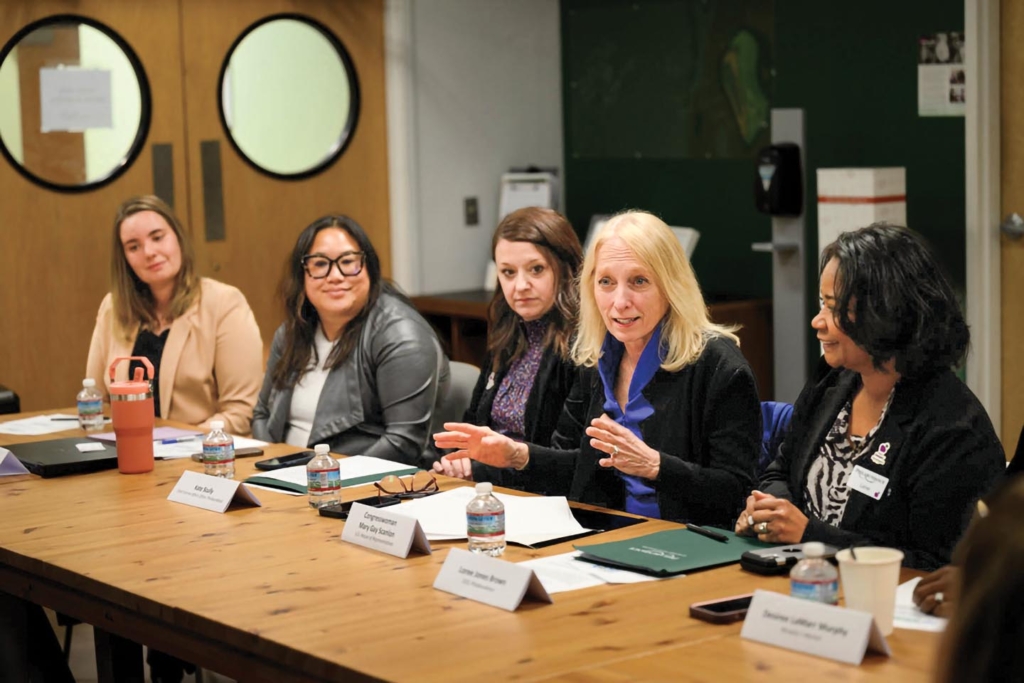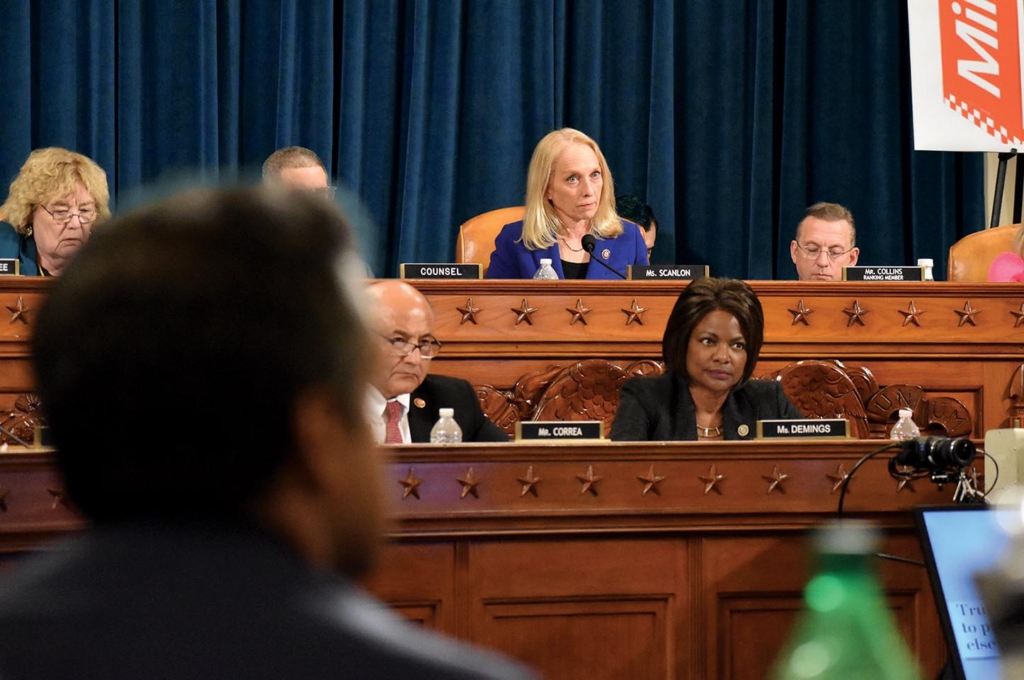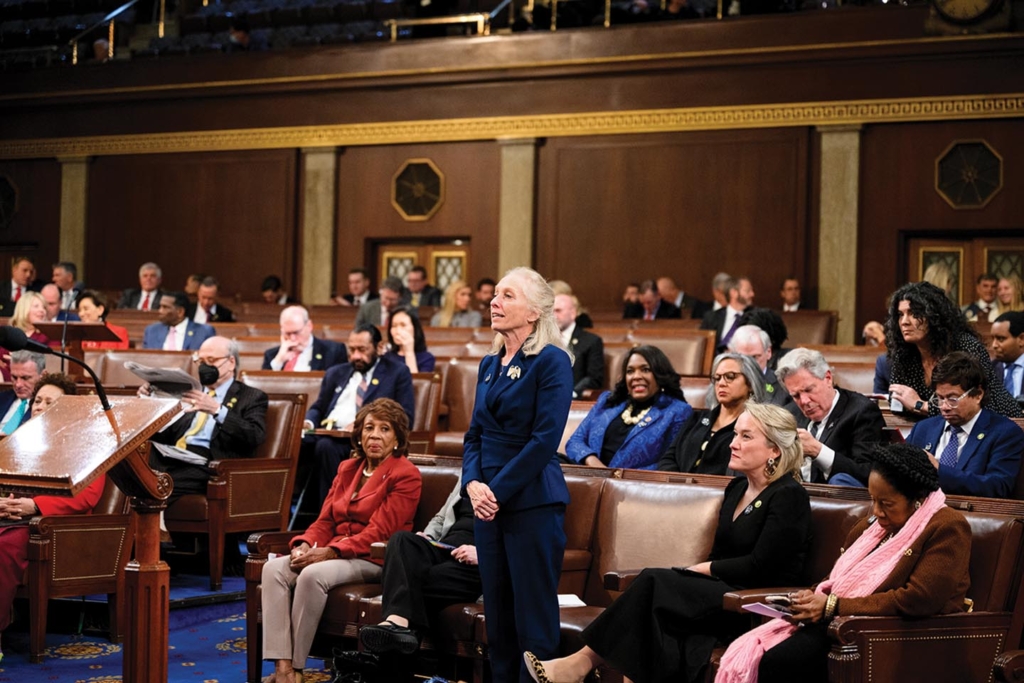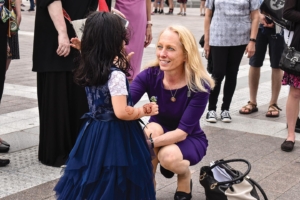She never wanted to go into politics — but when she made up her mind to do so, Scanlon became a congresswoman fighting for the underrepresented in her district and nationally.
In a matter of just 10 days in January 2018, Mary Gay Scanlon ’80 went from believing “I’d have to be crazy” to run for Congress to “I think I’m going to do this.”
Two news-breaking events affecting Pennsylvania’s 7th congressional district had Scanlon and others in her Swarthmore area wondering what was going to happen with their representation.
First, the New York Times released an article about GOP Rep. Patrick Meehan being involved in a sexual harassment scandal with a former aide (he would resign in April of that year).
A couple of days later, the State Supreme Court ruled Pennsylvania’s congressional district map to be a partisan gerrymander violating the state’s constitution.
Scanlon’s acquaintances told her: “You should run.”
“It was probably because I’d been complaining [so much] about the state of politics at the time,” she explains.
Because of policies passed during the Trump administration, the voting rights and immigration issues Scanlon had been focusing on as a national pro bono attorney “were suddenly under fire,” she says. “The first weekend he was in office, he signed the orders involving the Muslim ban, so we were organizing lawyers to go to airports and help people who had landed. We were training people to represent folks who were suddenly subject to deportation and hadn’t been previously.”

Her firm, Ballard Spahr, had also been working on the Obama Administration Clemency Initiative to address mass incarceration.
“The change in administration meant a radical change in policy,” she explains, “with a number of threats to issues I was interested in and in ways that really impacted the people who got caught in the middle.”
Another factor motivating Scanlon to run for Congress was that there were 18 Pennsylvania congressmen and two male senators, but there hadn’t been a woman in the state’s delegation since 2014. Scanlon had been participating in a group called Represent PA to raise money to elect more women to the state legislature. “I had an interest in women being in office, in positions of decision-making,” she says.
Scanlon had gained national experience working on issues through her pro bono work; locally, she’d been an election judge and worked at the Education Law Center in Pennsylvania for a decade. “I’d represented families in every school district, so I had a lot of ties throughout the region.”
She further demonstrated her commitment to education when she ran for her local school board. Similar to her later decision to campaign for Congress, Scanlon chose to become involved in the school board because she saw problems that needed to be fixed. She served two terms, as vice president and president, until the youngest of her three children graduated. “That was an appropriate time for other people to have their turn,” she says.
Although Scanlon asserts she “never wanted to go into politics,” she did know early on that she wanted to go into law. Her maternal grandfather, Leo Yehle, was a family court judge, and her father, Daniel Scanlon Jr. ’54, was an attorney who became a federal magistrate judge in Watertown, N.Y., where Mary Gay grew up. “The small-town practice my father had was appealing to me because he was problem solving for individuals, which was definitely the way I gravitated in my legal career doing public interest work,” she says.
Her role as an attorney provided Scanlon with political awareness, and her school board election gave her a sense of what it’s like to run for office.
In February 2018, the Pennsylvania Supreme Court released a redistricted map; a primary election was scheduled for May 15. “It was a very compressed time frame,” Scanlon says. “But eventually things fell into place.”

Ten candidates ran in the Democratic primary for the new District 5, and Scanlon won with 28.4% of the vote.
“It happened fast,” notes Donald Wilson ’79, who has traveled in similar circles as Scanlon both on Colgate’s hill and Capitol Hill. “She went from adroit civic and legal leadership, to a Democratic primary of 10 — many with far more political experience — to earning a tough district’s support [as well as] the key endorsement of the Philadelphia Inquirer and revered leaders, to winning.”
Then in November, she beat the Republican candidate and became one of four women who would represent Pennsylvania in Congress beginning in January 2019. It was the largest number of women the state had elected to federal office, and it occurred when a record number of women (103) across the country were elected to the House of Representatives.
Now Scanlon is in her third full term representing Pennsylvania’s 5th district, which includes Delaware County, the southern corner of Philadelphia, and part of Montgomery County.
Colgate Magazine spent time with the congresswoman this past spring, when she had recently returned from a delegation trip to Ireland with President Joe Biden, voted on House Speaker Kevin McCarthy’s debt limit bill, and was facilitating a roundtable with local nonprofits as they faced the expiration of pandemic emergency funds that had boosted SNAP (the Supplemental Nutrition Assistance Program).
Tell us about your work around food insecurity and what was discussed at the recent roundtable you led.
“Philadelphia is one of the poorest large cities in the U.S. It’s not [just] food insecurity; we have huge hunger issues. The topic actively is that a lot of the pandemic food relief expired [at the end of February], so what do we need to do? But it’s also ringing the alarm with respect to the cuts that are being proposed in D.C. — because 20% off already inadequate funding for programs like SNAP, early childhood education, or housing assistance is not good, so I’m trying to get a handle on what people are seeing right now.

“We saw the programs that, as everybody around the table said, made a difference and gave people the breathing room to get the medical care they needed or to have housing or have enough money to pay for childcare so they could go to a job. So it’s a struggle right now to maintain those kinds of benefits, to allow people to put themselves and their families in a better place. We have a situation where, for example, the expanded child tax credit worked. We raised kids out of poverty, we made them healthier, we allowed them to participate in school in a better way — which eventually is going to result in people being able to hold down jobs and pay social security taxes and support current generations. I truly believe that the rising tide can lift all boats. So I try to figure out ways to make those arguments across different sectors.
“The House Committee on Rules [of which Scanlon is a member] has been conducting a series of hearings around the issue of hunger with the goal of having a White House task force to try to update how we handle the issue. [Ranking member Jim McGovern] came here, and we did a tour in this region — trying to make sure we understand what’s happening, where the gaps are, and where we can try to fill those gaps.”
In addition to the House Committee on Rules, you’re a member of the House Judiciary Committee?
“Yes, I knew I wanted to be on the judiciary committee because so many of the issues I’ve worked on — voting rights, gun safety, criminal justice reform, and reproductive rights — are all part of the committee’s work. Because of my public interest background, I found that I am working on the same issues but in a different forum.”
What are some other issues you’ve been working on as congresswoman?

“We have a Congressional Youth Cabinet, which is 11th and 12th graders from across the district. We talk about the issues they’re interested in, what’s going on in Congress, and bring in experts. Recently we brought in someone from CeaseFirePA, the nonpartisan gun safety group. The next day was the Nashville shooting. So I sent the Youth Cabinet a note and said, ‘If you had a minute to talk to Congress, what would you say?’ They sent me amazing, heartbreaking things. I just took their words in to [Congress].”
What are some accomplishments you’ve been most proud of since you’ve been elected?
“In terms of concrete outcomes, when I was sworn in, in 2019, the Philadelphia Navy Yard was out of contracts. They’d had something like 1,800 people working there, and they were down to a skeleton staff of 60. So one of the first meetings I had was with the boilermakers in a trailer down on the waterfront. People were at the end of their rope because they got laid off, their health coverage was expiring, families were in distress. But I’ve gotten contracts in there for a series of multi-mission maritime training vessels, so we have contracts now through 2027, both to build new ships and to do repairs on existing Navy equipment. We’re developing pre-apprenticeship and apprenticeship programs, so there’s this way now for people to get really good jobs. They’re rehiring some people and then developing jobs for the next generation, so they’re back up to around 1,500 employees at the shipyard.
“I am also really proud of our work to engage students and the next generation of leaders. I love interacting with our youth cohort and hearing what they think are the most important issues. It is especially rewarding to see the young women and girls consider the ways they can lead in their futures, including running for office.”
Which Colgate professors had an influence on you?
“Marilyn Thie [philosophy and religion and women’s studies] was wonderful. One of the papers I did at the time was to take the philosophers we were studying and apply them to a current issue. That was fun. [She asked us to write about] the current issue [of] how Colgate’s fraternity system needed to adapt to the college’s admission of women.
“Stan Brubaker, political science — his constitutional law class got me through my UPenn constitutional law class. I used the notes. Thank God for him. I called him a couple of years ago and told him that.
“Jack Rakove, who’s now an endowed history professor at Stanford. He’s written Pulitzer Prize-–winning books about the constitution — his area of American history is constitutional interpretation. I’ve actually been in touch with him when I had constitutional questions the last few years. He knows that era and the writings of the founders better than probably anyone.”
What is it like working in Congress today?
“One of the things I love is that it’s 435 very different people with very different styles — I came in one of the biggest classes. We’ve got Lauren Underwood (IL-14), who’s a public health expert and started the Black Maternal Health Congress. That’s someone whom I can go to who really knows the issue inside out. Also, some of my colleagues are involved in clean energy; they’re going to take the lead on those things. Everybody’s coming with different skills, including how they approach Congress. There are the work horses and show ponies. I think of myself as one of the work horses.”
What keeps you up at night?
“Representing three quarters of a million people. There’s always something you can be doing.”
Insider Info
We asked two alumni who have had a longtime connection to Scanlon to sum up her character in just one word. Both needed three:
“Force of nature,” is how Todd Estabrook ’81 describes Scanlon, who has been his best friend since they grew up together in upstate New York. “When she gets involved in something, she sees it straight through to the end. Her energy is infectious, and that pulls everybody up along with her.”
Scanlon even brought Estabrook to Colgate. He visited her in Hamilton when she was a first-year and thought, “I definitely have to go there.” They’re close in age (she’s actually five weeks younger), but Scanlon was a year ahead of him in school because she skipped first grade. “And that’s pretty much Mary Gay,” he says, “she was ahead of the rest of our crew always.”
Seeing his longtime friend rise to the ranks of a congresswoman, Estabrook says, “I admire her so much. Her emotional quotient is just as high as her IQ. She reads people well, and she’s a good human being. She cares about the issues important to her constituents but also sees the larger national picture and how we have responsibility to care for everyone in the country — and she promotes policies that do that.”
Donald Wilson ’79 calls Scanlon “grace under pressure.” He adds: “You hear it in her voice: calm, tolerant, but truth telling with diplomatic power.” Wilson, who has worked with leaders and politicians nationally, reached out to her when she decided to run for Congress because he believed “she had extraordinary experience to offer.” They’ve kept in touch over the years, and Wilson has been supportive of “her great efforts, which are formidable.” For example, he says, Scanlon was elected vice chair of the House Judiciary Committee as a freshman, and she helped draft the language when it had to consider two articles of impeachment against President Donald Trump. “When there were tough [media] interviews to be done, up she stood, more than ready, and delivered difficult news to a nation hungry to hear reason and right thinking,” Wilson says.
Noting that she “has an intensely difficult job at one of our history’s most difficult hours, Wilson says that Scanlon has had genuine poise.
“Emerson wrote that the true test of heroism is its persistence. Mary Gay Scanlon is persistent in a glowing, empowering, inspirational way.”
Beyond the Bio Sheet
→ At Colgate: history major, worked on the Maroon-News, and also had a WRCU show on which she read the AP wire
→ Her name is short for Mary Gaynor, after her grandmother’s last name. All of the women in Scanlon’s family have a version of “Mary” in their name — including her two sisters, Elizabeth Maura ’83 and Mary Kathleen. “So Mary Gay became a way to differentiate [me],” she says.
→ Scanlon is often spotted wearing her signature color of royal blue. “It’s turned out, people look for it,” she says.
→ Colgate connections, to name a few: She has contributed to political science classes taught by James Snyder ’80, a fellow history major who now teaches at Le Moyne College. Although former Colgate President Rebecca Chopp was not at Colgate when Scanlon was a student, they connected as neighbors and at church when Chopp was president of Swarthmore College. Scanlon has known Men’s Basketball Head Coach Matt Langel since he was a toddler because “his dad was in the same law firm as me and my husband.”
